The conversation around attention-deficit/hyperactivity disorder (ADHD) has shifted in recent years. For a long time, many pictured a hyperactive child, believing it was something people simply “grew out of.” This narrow perception has unfortunately hidden a much wider reality. ADHD is a lifelong neurodevelopmental condition, frequently unrecognized and undiagnosed in adulthood.
At Elevate Counseling, we regularly see the profound impact that untreated ADHD in adults can have on careers, relationships, self-esteem, and overall mental well-being. It’s a quiet struggle shaping daily life.
A survey was conducted to gather insights from 100 adults living with ADHD. The aim was to deepen our understanding of challenges, daily realities, and support needs. We sought to identify common struggles, highlight overlooked symptoms, and explore how adults manage this condition.
Findings reveal a stark and often misunderstood reality: Adult ADHD is common and deeply impactful. All the information we gathered was used anonymously to support research, raise awareness, and guide development of tools and resources for adults with ADHD.
When Diagnosis Arrives in Adulthood
Adults in this survey came from diverse backgrounds, and all participants had a formal ADHD diagnosis. However, the timing of diagnosis tells a compelling story.
Nearly one-third, 29%, were not diagnosed until after age 25. An additional 17% received their diagnosis between ages 18-25. This means almost half (46%) of adults surveyed were diagnosed well into their adult years. This challenges the outdated myth that ADHD is solely a childhood condition or always affects only the young. It highlights widespread misunderstanding leading to millions struggling in silence for decades.
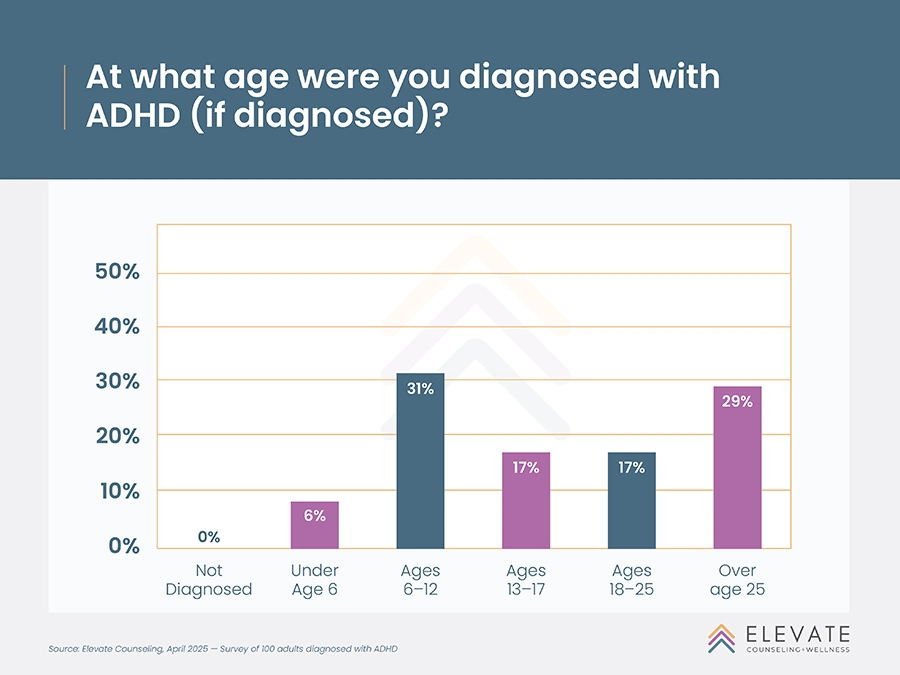
Many describe a mix of relief and sadness upon finally receiving an adult diagnosis. They gain clarity on lifelong struggles that might include a sense of being inherently "flawed," but also can begin reflection on years of feeling misunderstood or inadequate. For some, earlier misdiagnoses of anxiety or depression meant years of ineffective treatment, adding frustration.
Historically, ADHD has been underdiagnosed in women, people of color, and those primarily exhibiting inattentive-type symptoms. These individuals often don't fit the stereotypical “disruptive” profile of young boys, leading struggles to be dismissed.
Their symptoms might be displayed internally as chronic restlessness, pervasive disorganization, excessive daydreaming, or difficulty listening, rather than overt hyperactivity. This persistent lack of awareness can prevent many adults from accessing help, sometimes for decades.
For instance, “hyperfocus” on stimulating tasks is a common ADHD trait, often mistakenly seen as counter-evidence. In reality, it reflects a difficulty in regulating attention and not a lack of it. The ability to intensely concentrate on stimulating tasks while struggling immensely with less engaging ones is a key indicator of attention dysregulation.
Work, Finances, and Daily Life
ADHD's impact often extends deeply into vocational and financial stability. An astounding 85% of participants confirmed ADHD affected their employment or financial stability. Nearly half, 48%, reported frequent challenges. This isn't about intelligence or work ethic; it's about how ADHD interacts with modern demands.
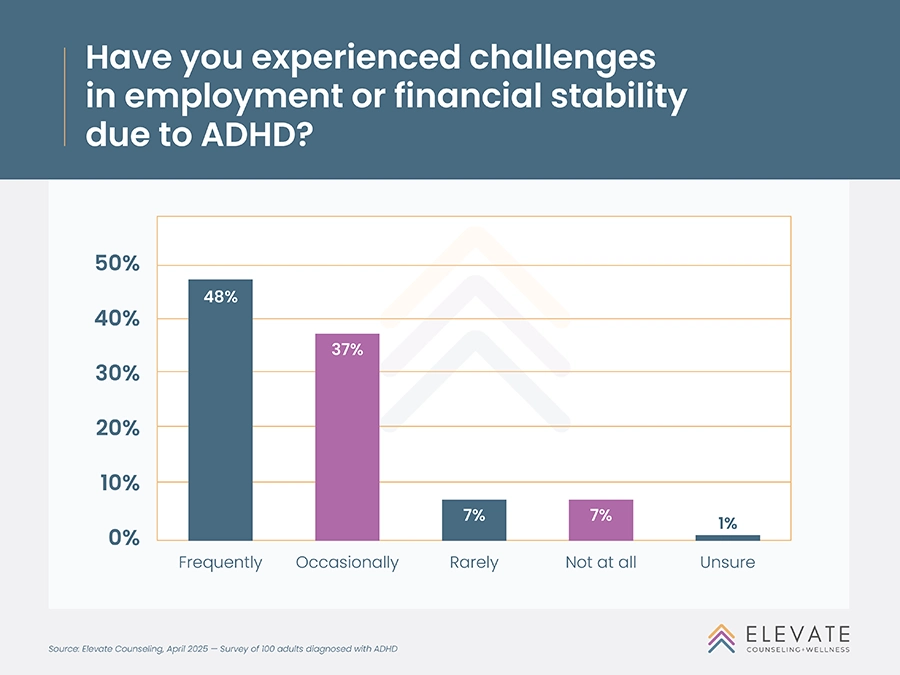
Adults with ADHD commonly struggle with executive functions, including skills such as planning, prioritizing, initiating tasks, organizing, managing time, and follow-through. Professionally, this means missed deadlines, difficulty with long-term projects, frequent job changes, or a feeling of underperformance. The internal chaos makes it hard to translate ideas into action or sustain focus on tedious tasks. Many describe a constant battle with procrastination, stemming not from laziness, rather from immense difficulty in initiating tasks or managing time, known as “time blindness.”
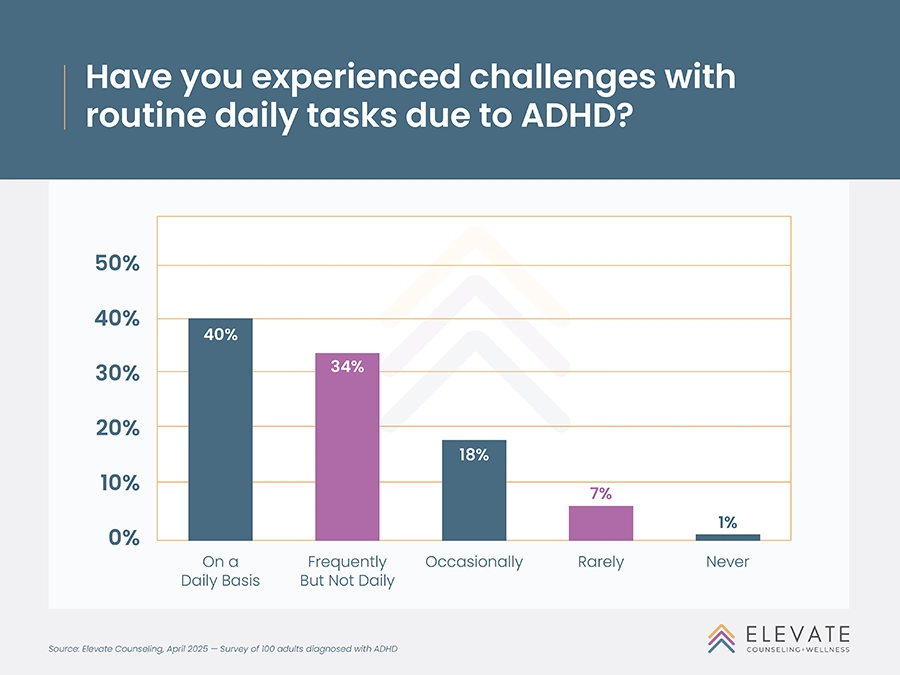
Challenges don't stop at work. Daily life and routine responsibilities also present significant hurdles, with 74% of respondents reported frequent (34%) or daily (40%) difficulty with routine tasks like housework, errands, and bill paying. Furthermore, 73% felt overwhelmed by routine responsibilities regularly (37% daily and 36% several times per week).
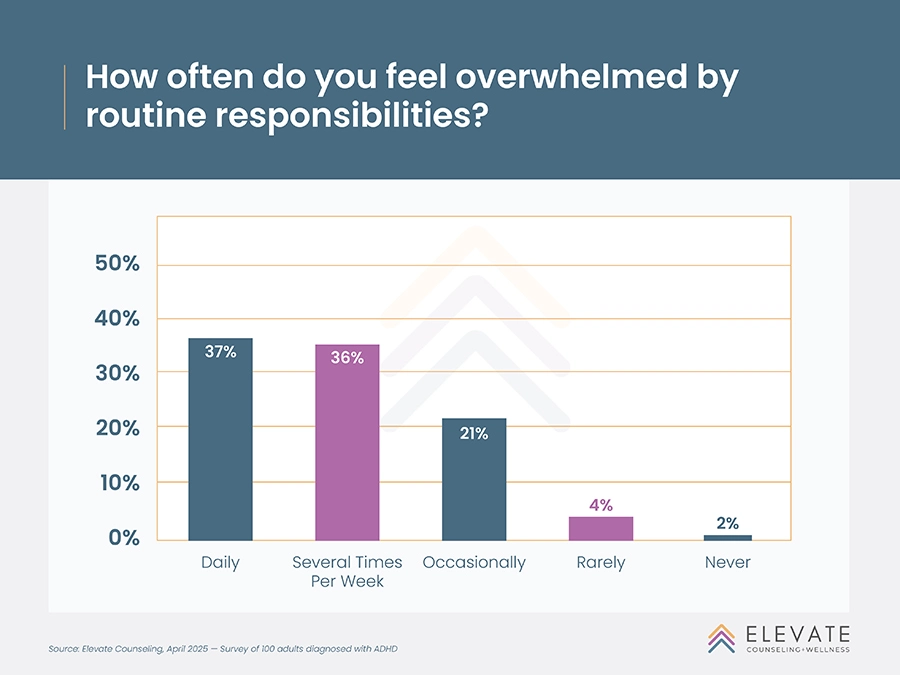
Dysregulation and Isolation
ADHD profoundly impacts emotional regulation: 71% reported emotional outbursts or mood swings multiple times a week (37% daily, 34% a few times a week). This is often displayed as intense reactions to minor frustrations, with emotions shifting rapidly.
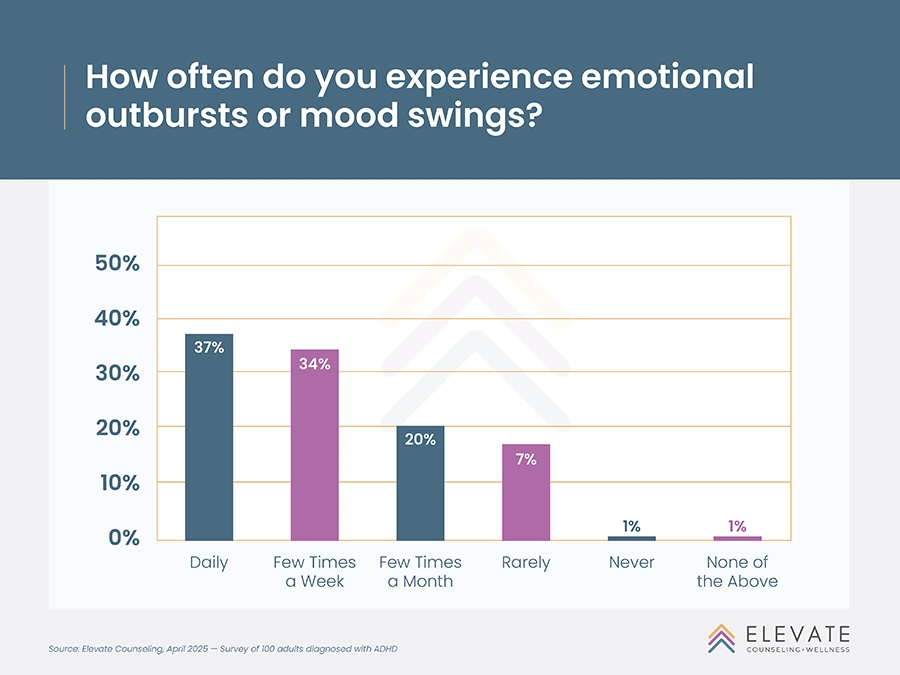
This aligns with widely accepted clinical research estimating up to 70% of adults with ADHD struggle with emotional dysregulation. This symptom often goes overlooked. The internal experience is intense frustration, anger, or despair, often followed by deep regret for the emotional “overshoot.”
One of the most poignant findings was social isolation. Over half (51%) said they frequently feel socially isolated due to ADHD symptoms. This significantly surpasses typical rates and points to overlap with social anxiety and rejection sensitivity. Rejection sensitive dysphoria (RSD), extreme emotional pain triggered by perceived criticism or rejection, is common among individuals with ADHD. Masking ADHD symptoms in social settings is also exhausting, making genuine connection feel out of reach.
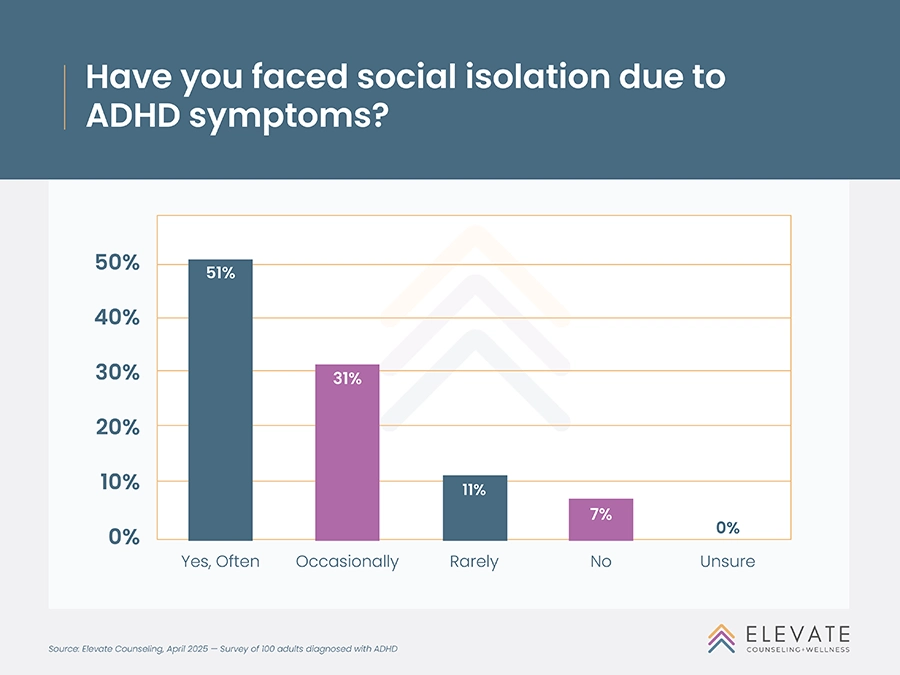
Co-occurring Conditions: A Complex Picture
An alarming revelation was the high rate of co-occurring mental health diagnoses. The vast majority reported at least one other condition alongside ADHD:
- Anxiety (88%)
- Depression (78%)
- Bipolar disorder (39%)
- PTSD (34%)
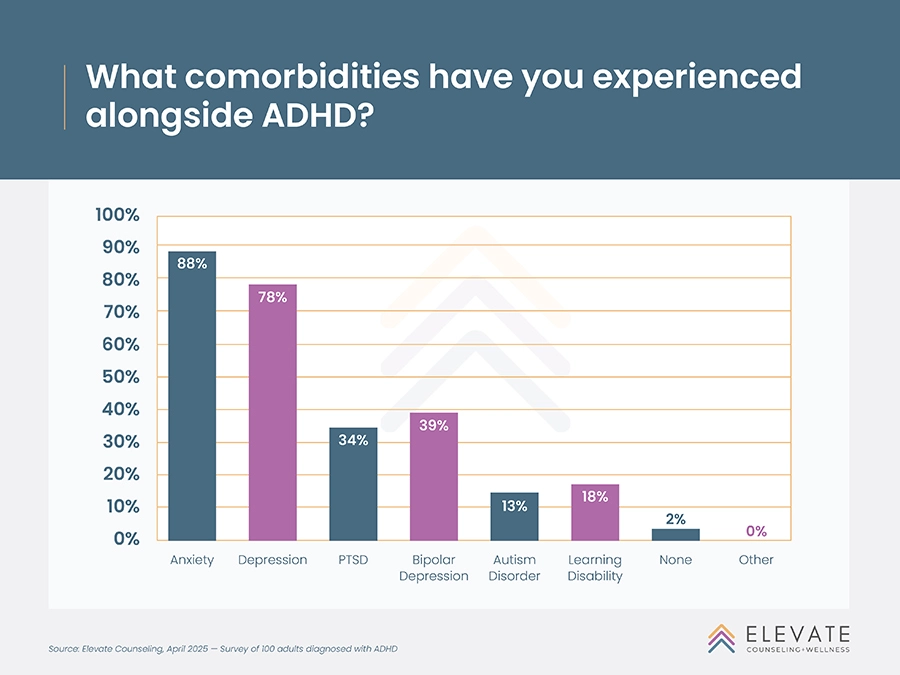
These numbers are dramatically higher than expected in the general population. This overlap shows the toll untreated ADHD takes on mental health and the difficulty in accurate diagnosis when multiple conditions are present. Chronic stress from ADHD can contribute to anxiety, and persistent underachievement might lead to depression. The diagnostic process is complex, as symptoms can mimic each other, leading to misdiagnoses if a comprehensive assessment isn't performed.
The survey also revealed a significant gap in care. Only 22% felt health care providers “very adequately” addressed the interplay between their ADHD and other conditions. In contrast, 36% felt care was “not very adequately” (23%) or “not at all” (13%) adequate. This highlights a critical need for integrated mental health care, where providers understand how conditions influence each other, rather than treating them in isolation.
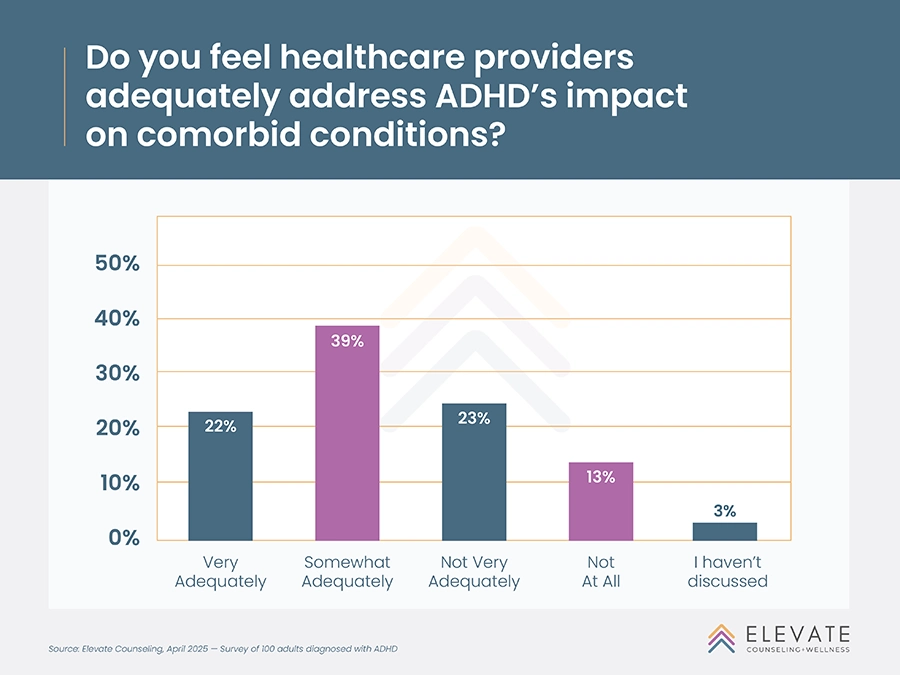
Impulsivity and Relationships
Impulsivity, a hallmark ADHD symptom, emerged as a significant theme. Nearly two-thirds, 62%, reported frequently engaging in impulsive behaviors they later regret (33% very often, 29% often).
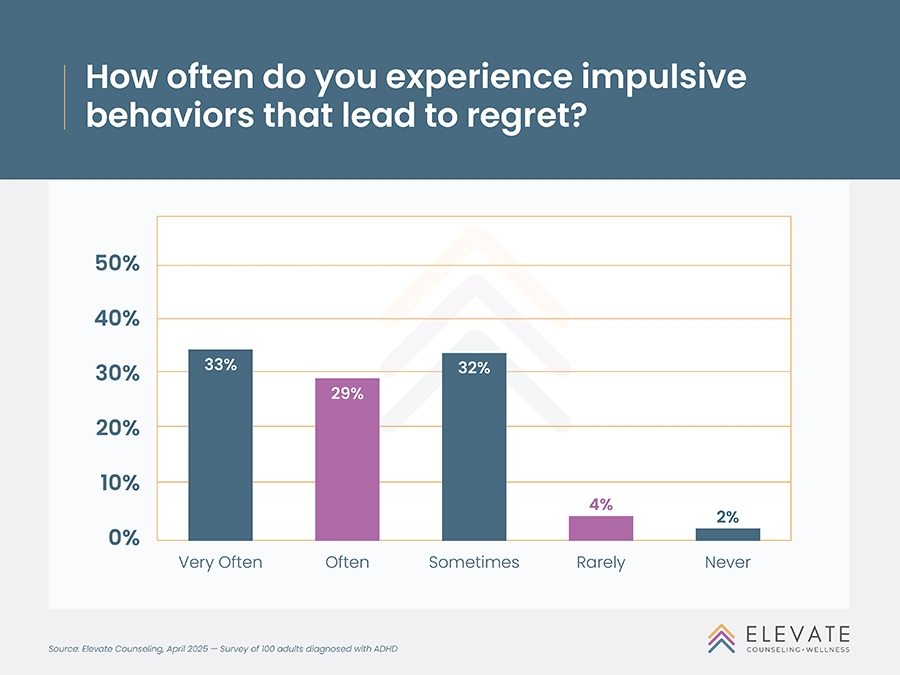
This can manifest as interrupting, making spontaneous large purchases, quitting jobs on whim, blurting thoughts, or acting without considering long-term consequences. Such behaviors lead to shame, financial difficulty, and strain in relationships. Immediate gratification from impulsivity creates long-term challenges, including accumulating debt or eroding trust.
The impact on personal connections is undeniable; 70% reported ADHD negatively impacted their ability to form or maintain relationships (20% significantly negative, 50% some negative). This can stem from forgetfulness, emotional intensity, or impulsive remarks.
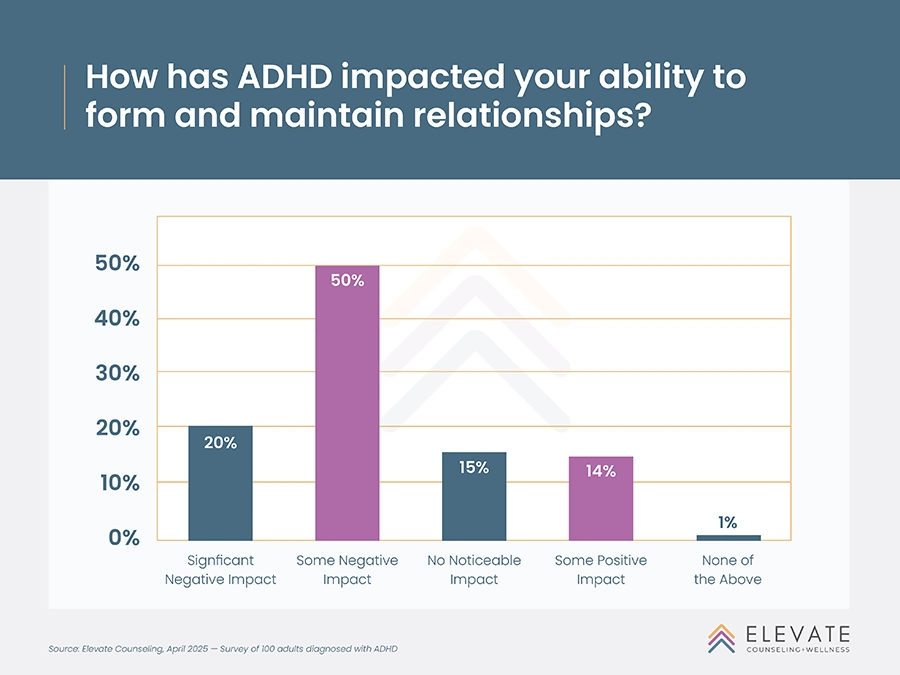
Regarding friends and family, 39% described the impact as negative (11% very negative, 28% somewhat negative). However, 28% found the impact positive (20% somewhat positive, 8% very positive), while 33% reported neutral. This aligns with published research. ADHD can be a source of stress and a catalyst for deep connection, especially when loved ones are informed and supportive.
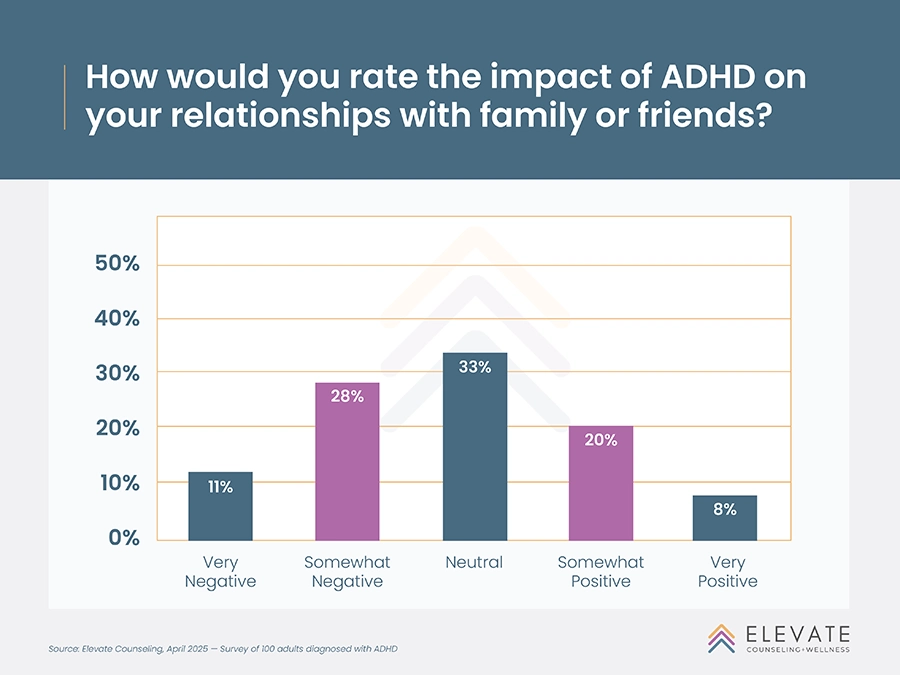
Treatment and Coping
Despite challenges, this survey provides insights into effective management strategies. Many adults find ways to cope and thrive. The most common approach was medication (72% of respondents). Beyond medication, various holistic and behavioral strategies proved beneficial:
- 72% take medication
- 59% use physical exercise
- 47% practice meditation or mindfulness
- 36% use cognitive behavioral therapy (CBT) techniques
- 35% employ time-blocking or calendar planning
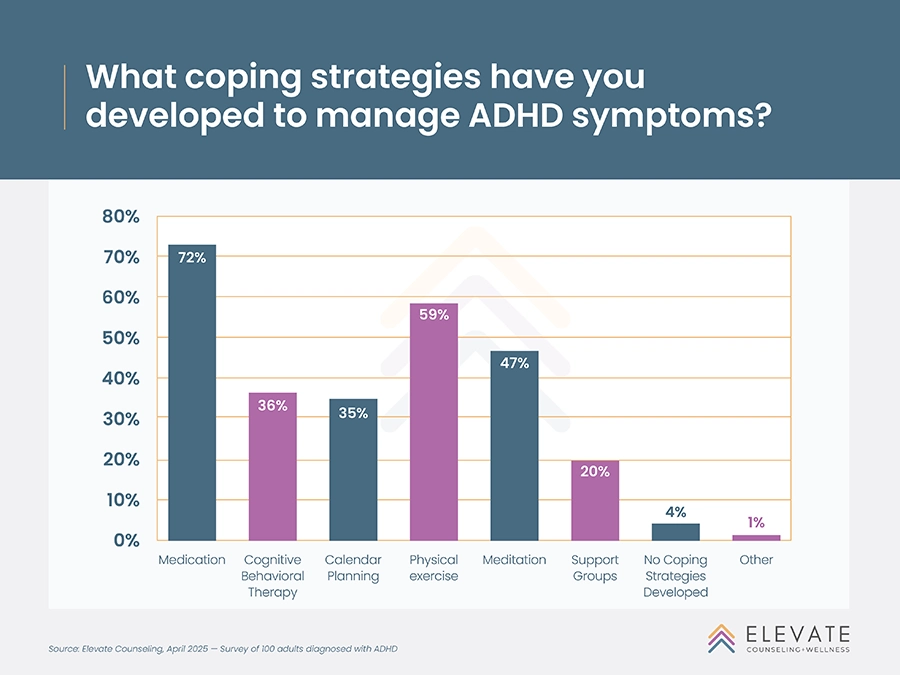
The fact that adults seek professional support and use diverse self-management tools shows growing awareness and resilience. Many discover a multi-modal approach, combining strategies tailored to their profile, yields the most significant improvements. Regarding mental health support, respondents gravitated toward social circles and professional guidance:
- Friends and family support (58%)
- One-on-one therapy (52%)
- Books, podcasts, and educational resources (25%)
- Online communities and forums (23%)
- ADHD coaching (27%)
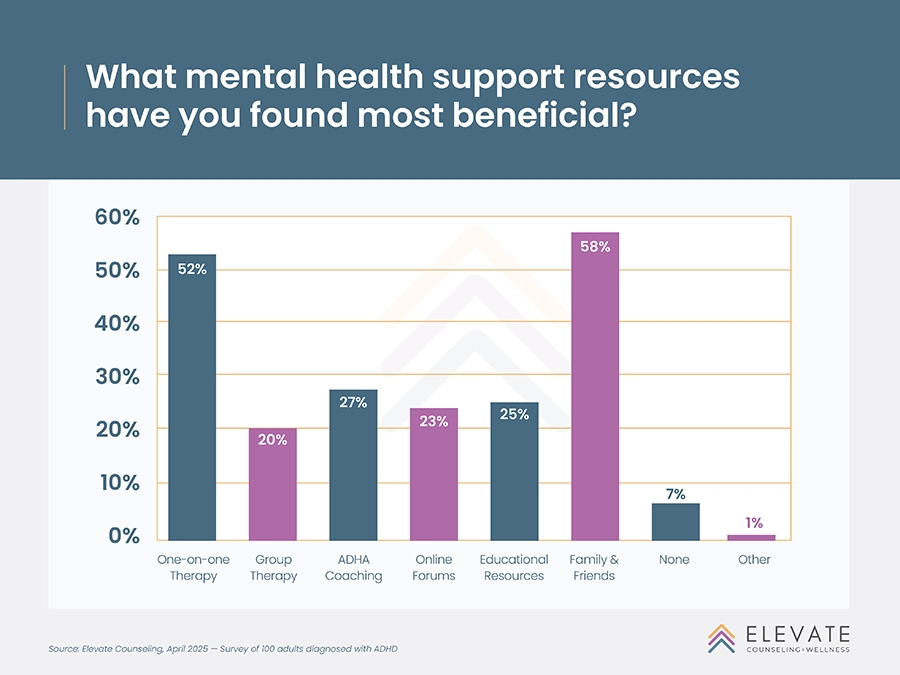
This data shows that no single solution works for everyone, and a solid professional and personal support system is invaluable. Online communities are essential spaces for shared experiences, reducing isolation. Telehealth and online resources also make access easier.
What This Means — And What Needs to Change
Survey results show that ADHD in adulthood is not rare, and its impact goes far beyond “focus issues.” It touches every part of life, including career, emotional regulation, mental health, relationships, and self-worth. It's a constant, often unseen battle against dysfunction and emotional storms.
However, there is significant hope. Increasing diagnoses later in life indicate growing awareness. Adults are actively seeking and finding support, developing coping skills, and asking informed questions about treatment.
The understanding of ADHD is evolving from a deficit-based model to one embracing neurodiversity, recognizing unique strengths, creativity, and remarkable resilience often found in individuals with ADHD. These strengths include innovative problem-solving, an ability to thrive under pressure, a distinctive way of connecting disparate ideas, and infectious enthusiasm for passions.
At Elevate Counseling, we believe ADHD should not be a hidden or solitary struggle. With compassionate care, accurate assessment, and integrated therapeutic approaches, adults with ADHD can not only manage symptoms effectively but truly thrive and build lives filled with purpose and connection. It’s about transforming challenges into opportunities for growth and self-acceptance.
Let Us Keep the Conversation Going
If you experience burnout, impulsivity, emotional swings, persistent challenges with work or connections, please know you are not alone. ADHD is a real, impactful condition, and genuine help is available.
Our dedicated team at Elevate Counseling is here to support you on your journey toward clarity and well-being. Contact us today to start a conversation and explore your options. You deserve to feel supported, understood, and empowered in navigating your unique path.
